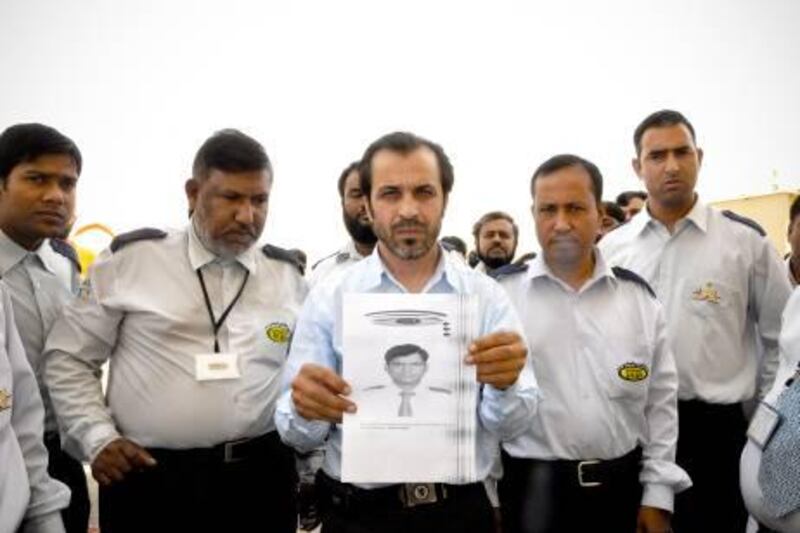AL AIN // Taxi drivers stripped off their neckties yesterday before forming a protest procession against unsafe working conditions, after the murder of a colleague.
"We don't want to wear these neckties," said Kazi Mohammed, a Bangladeshi driver for National Taxi. "It's the first thing people who attack us grab.
Video: Taxi drivers demand a safer work environment
Last Updated: June 13, 2011 UAE
Two men were arrested barely 14 hours after the body of Mohammed Enamulhaq, 28, a Bangladeshi driver with Tawasul, was found in his taxi near the Eid Mosque in the Markhaniya district of Al Ain in the early hours of Saturday.
Police attributed the swift identification and arrests to “secret informants and a diligent police investigation”. They have been referred to public prosecution.
"We shouldn't have to wear it … we can be strangled with it. As long as we wear it, we are not safe."
The demonstration, which began about 9am, was prompted by the murder of Mohammed Enamulhaq, 28, a Bangladeshi driver employed by Tawasul Taxi Company.
Mr Enamulhaq was found early on Saturday in his taxi with several stab wounds to his chest, strangled with his seatbelt and with his hands bound by his uniform necktie.
About 20 drivers for Tawasul were staging a protest outside their company accommodation. But after hearing their company's managers had been called to the prosecutors' office at the Al Ain Courthouse, they decided to drive there and called on colleagues to join them.
By the time the procession reached the courthouse there were more than 80 drivers from all six Al Ain taxi companies, ignoring people who were trying to flag them down.
All of the drivers had removed their neckties in a show of defiance against TransAD, Abu Dhabi's taxi regulatory agency, which imposes uniform guidelines on all drivers.
"We are here because no one cares about us," said Ikram Ul Haq, a Tawasul driver from Pakistan.
"If the police arrest people who don't pay us or come quickly when we are beaten, we will feel that we are protected, we will feel like humans, we will not feel like slaves like we do now."
Maj Fahad al Badri of the Al Ain Police came out to listen.
MORE UAE NEWS: Our pick of today's top local news stories
Last Updated: June 13, 2011
Emirates flights return to normal following ash plume cancellations Airline resumes its normal schedule but continues to monitor movement of ash cloud from Chilean volcano. Read article
Abu Dhabi carries out census test-run An emirate-wide census will be conducted by the end of the year. Read article
Husband disputes account of blaze rescues Husband who lost wife and child in Al Ain house fire and other witnesses dispute the Civil Defence account of events. Read article
Taxi drivers say their lives are on the line Taxi drivers in Al Ain stage a protest after one of their colleagues, Mohammed Enamulhaq, was found brutally murdered in his car. Read article
[ MORE UAE NEWS ]
"I hear your complaints and you are welcome to come to the police to discuss your issues and to complain, and you can visit TransAD's offices to complain as well," Maj al Badri said.
"By going through the proper channels, you will get results. But you cannot gather here and create a commotion."
He said all incidents reported to the police were treated with importance and police did not discriminate against anyone.
The protest ended about noon with no arrests or disturbances.
The drivers' concerns were echoed by those in other emirates who said their safety was occasionally at risk and their concerns often ignored.
In Sharjah, Syed Siddiqui, who works for Advantage Taxi, said whenever he called police about a client who refused to pay, the result depended on who spoke better Arabic.
"I could try to explain in my simple Arabic that the client wanted to run with taxi money but if the client was an Arab-speaking national I would always lose the case," Mr Siddiqui said.
Some Dubai drivers said it could be dangerous to pick up passengers late at night.
"There is always a fear of security when we take passengers," said an 11-year veteran from Cars Taxis who asked not to be identified.
"I usually never take more than two passengers at nights, since there have been incidents in the past where customers have ganged up against drivers to steal from them."
But Joven Ballatan, 37, who has worked as a taxi driver for two years in Abu Dhabi, said it was generally safe to drive in the capital.
And a Bangladeshi driver for Al Arabiya in Ras al Khaimah, who did not want to be named, said he felt comfortable working around the clock because of police support. He said police often paid for skipped fares out of their own pockets.
* With additional reporting from Anna Zacharias, Yasin Kakande, Preeti Kannan, Ramona Ruiz, Bana Qabbani and Ramola Talwar Badam






